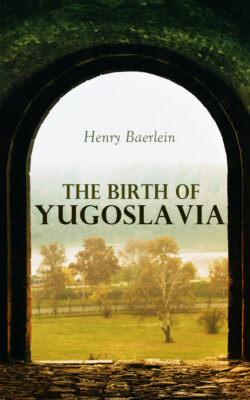Читать книгу The Birth of Yugoslavia - Henry Baerlein - Страница 12
На сайте Литреса книга снята с продажи.
ECCLESIASTICAL ROCKS
ОглавлениеNow Christianity had been definitely introduced into Dalmatia in the fourth century, but it was not until several centuries later that it made any headway with the Slavs, of whom the Croats, in the ninth century, were baptized by Frank missionaries. The arrival of the Slavs, by the bye, had been sometimes looked upon with scanty favour by the Popes: in July of the year 600 we find Gregory I. saying in a letter to the Bishop of Salona that he was much disturbed at the news he had just received "de Sclavorum gente, quæ vobis valde imminet, affligor vehementer et conturbor." Similarly, the Council of Split branded the Slav missionaries as heretics and the Slav alphabet as the invention of the devil.[6] … While the Croats were falling[7] under the dominion of the Franks, the holy brothers St. Cyril and St. Methodus, who had been born at Salonica in 863, were carrying the first Slav book from Constantinople to Moravia, whither they travelled at the invitation of the Prince of Moravia, Rastislav, St. Cyril going as an apostle and theologian, St. Methodus as a statesman and organizer. This famous book was a translation from the Greek, but it was written in Palæo-Slav characters, the Glagolitic that were to become so venerated that when the French kings were crowned at Reims their oath was sworn upon a Glagolitic copy of the Gospels;[8] and the spirit of that earliest book was also Slav: it expresses the political and cultural resistance of Prince Rastislav against the State of the Franks, that is, against the German nationality, of whom it was feared that with the Cross in front of them they would trample down for ever the political liberties of the young Slav peoples. German theologians were giving a more and more dogmatic character to Western Christianity, whereas the Christianity of the East was at that time more liberal; it gathered to itself the Slavs of Raška and of the neighbouring regions, such as southern Dalmatia, while the influence which it exerted was so powerful that when the Croats, after vacillating between the two Churches, finally joined that of Rome, they took with them the old Slav liturgy that is used by them in many places on the mainland and the islands down to this day. Thus their Church became a national institution, and that in spite of all the long-continued efforts of the Vatican, as also of the Venetian Republic. The Roman Catholic hierarchy, by the way, is endeavouring to have this liturgy made lawful in the whole of Yugoslavia; the only opponent I met was a Jesuit at Zagreb who foresaw that the priests, being no longer obliged to learn Latin, might indeed omit to do so. Pope Pius X. was likewise an opponent of the Slav liturgy, because a Polish priest told him that it would lead to Pan-Slavism and hence to schism; but it is thought—among others by the patriotic Prince-Bishop Jeglić of Ljubljana—that the late Pope would have given his consent, had it not been for Austria, which recoiled from what would have probably strengthened the Slav element. One of the cherished policies of Austria was to utilize in every possible way the religious differences between the Southern Slavs.
